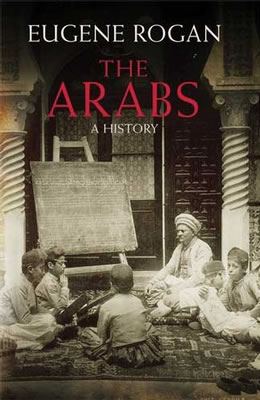 Nobody could complain of a shortage of books about the Middle East, or about that often nebulous entity “the Arabs”. On themes like the Arab-Israeli conflict, the flow has been unrelentingly copious for decades. Since 9/11 and the Iraq war, works seeking to address the region as a whole have come in floods. Too many of them, though, are purely polemical – and mostly in rather predictable ways. The greatest bulk by far carries the silent, collective subtitle “How Did We (America, Britain, the West in general) Get Into This Mess?” Another, lesser but persistent genre asks how another and often antithetical “We” – we Arabs, we Muslims, we inhabitants of that ill-defined region – end up in such a terrible bloody hole. Much, naturally, focuses on particular countries or issues. Far too little recent writing has attempted to provide a clear, reliable, dispassionate general survey of the historical background to current agonies and dilemmas. And surprisingly little, too, really explores or explains such questions as “Who are ‘the Arabs’ anyway?” What, beyond the language itself, really unites the states and societies across the vast region where people mostly speak Arabic? How does this collective identity, so variously imagined and constantly reinvented, relate to others like (most obviously) “Islam”?
Nobody could complain of a shortage of books about the Middle East, or about that often nebulous entity “the Arabs”. On themes like the Arab-Israeli conflict, the flow has been unrelentingly copious for decades. Since 9/11 and the Iraq war, works seeking to address the region as a whole have come in floods. Too many of them, though, are purely polemical – and mostly in rather predictable ways. The greatest bulk by far carries the silent, collective subtitle “How Did We (America, Britain, the West in general) Get Into This Mess?” Another, lesser but persistent genre asks how another and often antithetical “We” – we Arabs, we Muslims, we inhabitants of that ill-defined region – end up in such a terrible bloody hole. Much, naturally, focuses on particular countries or issues. Far too little recent writing has attempted to provide a clear, reliable, dispassionate general survey of the historical background to current agonies and dilemmas. And surprisingly little, too, really explores or explains such questions as “Who are ‘the Arabs’ anyway?” What, beyond the language itself, really unites the states and societies across the vast region where people mostly speak Arabic? How does this collective identity, so variously imagined and constantly reinvented, relate to others like (most obviously) “Islam”?
Eugene Rogan’s book thus aims to fill a yawning gap. In great part, it succeeds brilliantly; but almost equally, on another front, it disappoints. That is, it is mostly excellent in giving a lucid and fair-minded narrative of the Arab world’s recent history. It does not, though, say much about the deeper, often troubling underlying questions mentioned above. Rogan is thus open to the complaint that he does not really explain why a book called The Arabs is necessary or even possible, when the titular entity is both so internally fissured and has such blurred boundaries.
Rogan’s book inevitably invites comparison with maybe its most direct predecessor, Albert Hourani’s 1991 History of the Arab Peoples. In some ways it suffers in the contrast. Whereas Hourani ranged back across millennia, dealt extensively with social, cultural and intellectual history, and probed constantly at the fundamental question of Arab identity, Rogan’s focus is far narrower and his approach less reflective. Hourani, the intellectual godfather of Oxford’s Middle East Centre where Rogan teaches, tended to ruminate and even meander. His long passages on medieval Arab philosophers or the complexities of urban social structure didn’t seem, to impatient present-minded critics, much help in understanding Saddam Hussein, Yasser Arafat or al-Qaeda. For that, Rogan is far more useful. The Arabs may indeed be short on the long view, thin on thick description, poor on the riches of Arab cultures and ideas. It may fly too far above the insights one might get from “history from below” – Rogan does drop in some passages of commentary from relatively humble, often female, Arab observers of the events he narrates, but one wishes there’d been more. Yet there are great compensating strengths, which might be better appreciated if we simply amend the book’s title. It is not really The Arabs: A History, but “A Modern Political History”. Even within that compass Rogan has, as he notes quite candidly, to be selective. Some countries and questions, especially Lebanon, Palestine and Egypt, get quite detailed treatment. Others, including most of North Africa and, more surprisingly, Iraq, are only rather hastily sketched. He is stronger on international relations, not least on the impact and legacies of Ottoman, British and French imperialism, than on internal social dynamics.
These, though, are ungenerous complaints. Rogan has covered a vast territory and could not possibly give full coverage to every patch of it. On a whole series of intensely contentious themes – above all, of course, how to apportion blame for the roots and persistence of the Israeli-Palestinian quarrel – he is just about as balanced as any mere mortal could be. And if his last pages sit firmly on the fence between grounds for optimism (like some Arab states’ progress in education, media freedom and women’s rights, or hopes raised by the Obama presidency) and gloomier forebodings, that agnosticism is surely plain good sense. The region which produced so many ancient prophets has always confounded would-be modern ones. The Arabs will be essential to anyone needing a clear, brisk, reliable overview of the region’s recent past. Those who want to go deeper could do well to read, alongside Rogan’s work, that of his great precursors like Hourani.
The Arabs is published by Allen Lane

